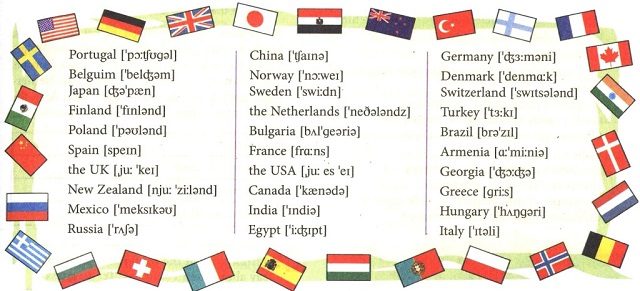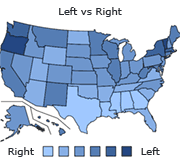What is your country of nationality
What is your country of nationality
Countries and Nationalities. Английские слова по теме «Страны и национальности». Список №1
Повторяем названия стран, столиц и национальностей на английском языке.
Countries and Nationalities. Английские слова по теме «Страны и национальности». Список №1
Сначала давайте повторим названия стран на английском языке, а также национальностей.
Страны (Countries) — Национальность (Nationality) — Язык (Language):
Страны (Countries) — Столицы (Capitals):
Countries and Nationalities. Упражнения
Упражнение 1. Переведите на английский язык.
Упражнение 2. Задайте и ответьте на вопросы.
Упражнение 3.Задайте и ответьте на вопросы.
ОБРАЗЕЦ. What is the capital of Great Britain? — The capital of Great Britain is Moscow.
Упражнение 4. Задайте и ответьте на вопросы. Используйте выражение be famous for — быть известным за…
ОБРАЗЕЦ. What is Great Britain famous for? — Great Britain is famous for its Queens.
Упражнение 5. Ответьте на вопросы о себе.
Упражнение 6. Представьте, что вы присутствуете на международной конференции. Скажите несколько слов о себе.
Названия стран, языков и национальностей на английском
Nationality vs Национальность
В английском языке немало так называемых «ложных друзей переводчика». Вот и слово nationality, несмотря на сходство с русским «национальность», в английском имеет немного другое значение: «гражданство» какой-либо страны (синоним — citizenship). Это слово и вопрос «What is your nationality?» можно скорее увидеть в официальных бланках анкет, чем услышать в речи. В разговоре же спросят:
— Where are you from? / Where do you come from?
— I am from Chile.
— Откуда вы?
— Я из Чили.
Ответить можно следующими способами:
Если же мы хотим спросить или рассказать о происхождении, национальности, этнических корнях, то используем выражения ethnicity, ethnic origin, ethnic background, ancestry («национальность, национальная или расовая принадлежность»). Вопросы могут звучать таким образом:
— What is your ethnic background? / What is your ethnicity?
— I am half English, half French.
— Кто вы по происхождению?
— Я наполовину англичанин, наполовину француз.
— What is your race?
— I am Asian.
— К какой расе вы принадлежите?
— Я азиат.
— What are you?
— I am mixed. My mother is Puerto Rican, and my father is African American.
— Кто вы по происхождению?
— Я метис. Моя мама — пуэрториканка, а папа — афроамериканец.
Названия стран, их жителей и языков: правила
В первую очередь важно запомнить, что в английском языке названия стран, языков и национальностей всегда пишутся с заглавной буквы, так как все они — имена собственные.
Названия стран уникальны. Они могут быть не связаны с названием национальностей проживающих в них людей или действующим официальным языком. А вот название официального языка конкретной страны и название ее жителей в английском языке, как правило, совпадают друг с другом. Посмотрите:
Названия языков и народов образуются от названий стран с помощью специальных суффиксов:
Эти суффиксы имеют различное происхождение, например суффикс -i арабского происхождения, поэтому встречается в основном в названиях исламских народов. Можно также выделить некоторые закономерности, например для стран, заканчивающихся на -ia, название национальности образуется с помощью суффикса -ian: Austria-Austrian, Australia-Australian. Но в целом названия стран, языков и национальностей нужно запомнить.
Названия национальностей в английском могут выполнять роль как существительного, так и прилагательного:
Для некоторых национальностей наряду с прилагательными есть особые формы существительных. Например:
Чтобы назвать все население страны во множественном числе, ставим артикль the:
Определенный артикль используется с названиями языка только в словосочетаниях с language (в остальных артикль не нужен):
Названия большинства стран не требуют артикля. Определенный артикль the необходимо добавить, если:
Названия стран мира, их официальных языков и национальностей на английском: список
Ниже мы приводим список английских названий большинства стран мира с указанием названия национальностей проживающих там людей (еще раз подчеркиваем, что речь идет не об этнической принадлежности, а о гражданстве). Также в списке приведены официальные языки каждой из стран (перечень языков общения для некоторых стран может быть неполным).
What’s Your Secret European Nationality?
Between most of the countries in Europe, where do you really belong? Which Nordic, Scandinavian, Latin, or Germanic country does your personality just snap with?
Note: Sorry I couldn’t list some countries—but don’t worry—I did include Nordic and Scandinavian countries! I really wanted to make it a world quiz but it only let me put so many countries, so—I definitely will have a North/South America, Asia, Oceania, and Africa quiz soon. Also, these are all based on the general feel I got from living in these countries and from my friends, so if there is anything you don’t like just let me know! I’m open to feedback. (Last thing—Just try to ignore the spelling haha, my computer is on UK autocorrect so «realize» turns into «realise»)
Rate and Share this quiz on the next page!
You’re about to get your result. Then try our new sharing options.
Related Quizzes:
What is GotoQuiz? A fun site without pop-ups, no account needed, no app required, just quizzes that you can create and share with your friends. Have a look around and see what we’re about.
Quiz topic: What’s my Secret European Nationality?
Trending Quizzes
Special Feature
Try the top political quiz on GoToQuiz to find where you fall on on multiple axes, then compare your results to others’.
We’re Testing
Send Feedback about GoToQuiz, report a bug or error, make a suggestion!
Таблица названий стран и национальностей на английском языке
Сегодняшняя тема называется nationality words.
Ошибки на страны и национальности являются самыми распространёнными среди начинающих.
| country | adjective | person | nation | перевод |
| Russia | Russian | a Russian | the Russians | Россия |
| America (the USA) | American | an American | the Americans | Америка |
| Great Britain | British | a Briton a Brit | the British | Великобритания |
| Germany | German | a German | the Germans | Германия |
| Italy | Italian | an Italian | the Italians | Италия |
| Belgium | Belgian | a Belgian | the Belgians | Бельгия |
| Brazil | Brazilian | a Brazilian | the Brazilians | Бразилия |
| Mexico | Mexican | a Mexican | the Mexicans | Мексика |
| Norway | Norwegian | a Norwegian | the Norwegians | Норвегия |
| Latvia | Latvian | a Latvian | the Latvians | Латвия |
| Lithuania | Lithuanian | a Lithuanian | the Lithuanians | Литва |
| Estonia | Estonian | an Estonian | the Estonians | Эстония |
| China | Chinese | a Chinese | the Chinese | Китай |
| Portugal | Portuguese | a Portuguese | the Portuguese | Португалия |
| (also: Japanese, Burmese, Lebanese, Vietnamese, Congolese) | ||||
| Switzerland | Swiss | a Swiss | the Swiss | Швейцария |
| Denmark | Danish | a Dane | the Danes | Дания |
| Finland | Finnish | a Finn | the Finns | Финляндия |
| Poland | Polish | a Pole | the Poles | Польша |
| Scotland | Scottish Scots | a Scot a Scotsman/woman | the Scots Scotsmen | Шотландия |
| Sweden | Swedish | a Swede | the Swedes | Швеция |
| Turkey | Turkish | a Turk | the Turks | Турция |
| England | English | an Englishman/woman | the English | Англия |
| France | French | a Frenchman/woman | the French | Франция |
| the Netherlands (Holland) | Dutch | a Dutchman/woman | the Dutch | Голландия |
| Austria | Austrian | an Austrian | the Austrians | Австрия |
| Ireland | Irish | an Irishman/woman | the Irishmen the Irish | Ирландия |
| Spain | Spanish | a Spaniard | the Spanish | Испания |
| Greece | Greek | a Greek | the Greeks | Греция |
| Egypt | Egyptian | an Egyptian | the Egyptians | Египет |
| United Arab Emirates (UAE) | Arab | an Arab | the Arabs | Объединенные Арабские Эмираты (ОАЭ) |
| Chechnya | Chechen | a Chechen | the Chechens | Чечня |
| Dagestan | Dagestani | a Dagestani | the Dagestani | Дагестан |
| Georgia | Georgian | a Georgian | the Georgians | Грузия |
| Israel | Israeli | an Israeli | the Israeli | Израиль |
| Kazakhstan | Kazakh | a Kazakh | the Kazakhs | Казахстан |
| Mongolia | Mongolian | a Mongolian | the Mongolians | Монголия |
| Belarus | Byelorussian | a Byelorussian | the Byelorussians | Беларусь |
| Ukraine | Ukrainian | a Ukrainian | the Ukrainians | Украина |
| Bulgaria | Bulgarian | a Bulgarian | the Bulgarians | Болгария |
| Korea | Korean | a Korean | the Koreans | Корея |
| India | Indian | an Indian | the Indians | Индия |
| Thailand | Thai | a Thai | the Thai(s) | Таиланд |
| Australia | Australian | an Australian | the Australians | Австралия |
| Canada | Canadian | a Canadian | the Canadian | Канада |
| New Zealand | New Zealand / Zelanian | a New Zealander | New Zealanders | Новая Зеландия |
| Peru | Peruvian | a Peruvian | the Peruvians | Перу |
| Somalia | Somali | a Somali | the Somali | Сомали |
❤ Поделись статьей с друзьями! И подпишись на email-рассылку и Twitter. ❤
English Guru
Автор 312 статей в этом блоге.
What “Country of Residence” and How to Know Yours When on a Visa
Posted by Frank Gogol
Updated on April 29, 2022
Immigrating to the U.S. can involve filling in dozens of complicated forms. It’s easy to get mixed up with all the different terminology being used.
One of the most common confusions arises when it comes to figuring out the difference between nationality and country of residence. These concepts relate to where you’re from, but your answer could vary depending on the context of the question being asked.
It can get especially frustrating if you’re an immigrant applying for permanent residency in the U.S. and you’ve always been on the move between countries.
To make this small part of your application easier, we explain the difference between nationality and country of residence (and how to differentiate between the two when filing your green card application***) below.
Table of Contents
Defining Country of Residence
What exactly does your “country of residence” mean? Your country of residence is the country where you are granted permission to live permanently. You also need to have lived there for the majority of the last 12 months for it to be considered your true country of residence.
This does not include countries you may have visited in between, either for business, leisure, or visiting family on a short-term basis.
Difference between Country of Residence and Nationality
While your country of residence and nationality sound like they refer to the same place, they actually mean two different things. However, they can both have the same answer if you happen to live and work in the country of your birth or naturalization.
Country of Residence
Your country of residence isn’t necessarily the same as the country you have a passport for. Especially if you’re living and working in another country on a visa or have permanent residency there.
If you’re living in a country that’s different from the country of your passport and you’re in the process of applying for a visa or permanent residency there, the country you are applying in would also be considered your country of residence.
In the U.S. for example, this might be the case if you are a green card applicant or green cardholder. Or even if you are an H1B visa applicant or an H1B visa holder for example.
Nationality
Your nationality would be your country of origin and would normally be reflected by the country of your passport. You are a citizen of this country and fall under its jurisdiction and protection on an international level.
You can have dual nationality if you have naturalized*** in a different country after living there for a certain amount of time. Although not all countries allow dual citizenship.
What’s the difference?
If you only have residency in a country where you work, it means you aren’t eligible for a passport of that country and the benefits that might come with it.
For example, as a resident in a European Union (EU) country (i.e. the EU country is your country of residence but you’re not a citizen), you may be able to move around to other EU countries for a visit. But you will only be allowed to live in your country of residence.
If you are an EU national (or citizen) with an EU passport, however, you would be able to work and live in any EU country due to the benefits of your citizenship.
Basically, your nationality determines which country’s passport you travel with and are protected by. This is related to your citizenship. Your country of residence can be the same as your nationality if you live in that same country. But if you have a visa or permit that gives you the right to live permanently in a country outside of your country of origin, that country will then be your country of residence.
Does a visa from another country affect your Country of Residence?
The short answer is no. Your country of residence is mainly affected by how long you would stay somewhere on a visa. Your country of residence is considered to be the place where you live at least more than half of a year. The fact that you have a visa for a country doesn’t automatically make that country your country of residence if you don’t stay there for long.
If you are a permanent resident of the U.S., but you’re out of the country for longer than a year you could lose your permanent residency. Returning to the U.S. can be complicated even if you’ve only been gone for six months.
So just getting a visa from another country doesn’t affect your country of residence unless you stay there the longest in a year.
Country of Residence and Form I-485
The U.S. immigration Form I-485 is part of the procedure to register for permanent residence or to adjust status in America.
This can be done either through a job offer, asylee status, refugee status, or through family who are already living in the U.S.
One of the sections in the Form I-485 will ask you to fill in your or a relative’s country of residence. The immigration officials need this information to determine where you’re currently living for communication purposes. They also need to see if there are any special considerations or country laws that might affect your application.
Be sure to fill in the country where you are physically residing on a long-term basis at the time of submitting the form. This could very well be the U.S. itself, and not the country of your passport.
Read More
Conclusion
Understanding the terminology of immigration processes is important for smooth residency applications. Part of this is understanding what your country of residence is. We live in a globalized world and it’s important to know how to differentiate between where you’re from and where you’ve made a home.
Need a Loan? Get One in 3 Simple Steps
If you are considering applying for a personal loan, just follow these 3 simple steps.
Apply
Apply online for the loan amount you need. Submit the required documentation and provide your best possible application. Stronger applications get better loan offers.
Accept
If your application meets the eligibility criteria, the lender will contact you with regard to your application. Provide any additional information if required. Soon you’ll have your loan offer. Some lenders send a promissory note with your loan offer. Sign and return that note if you wish to accept the loan offer.
Repay
The loan then gets disbursed into your U.S. bank account within a reasonable number of days (some lenders will be as quick as 2-3 business days). Now you need to set up your repayment method. You can choose an autopay method online to help you pay on time every month.
About Stilt
Stilt provides loans to international students and working professionals in the U.S. (F-1, OPT, H-1B, O-1, L-1, TN visa holders) at rates lower than any other lender. Stilt is committed to helping immigrants build a better financial future.
We take a holistic underwriting approach to determine your interest rates and make sure you get the lowest rate possible.




